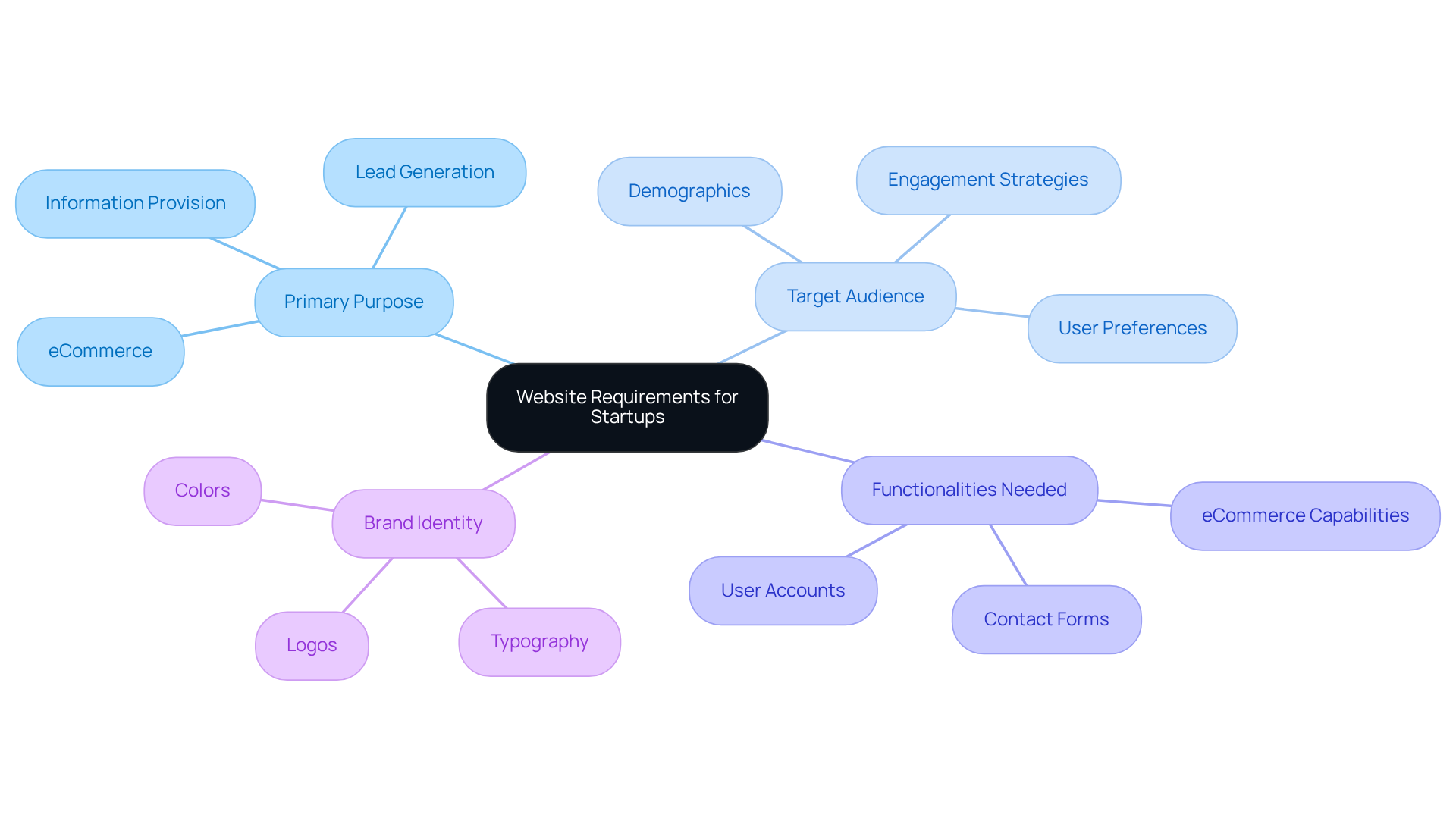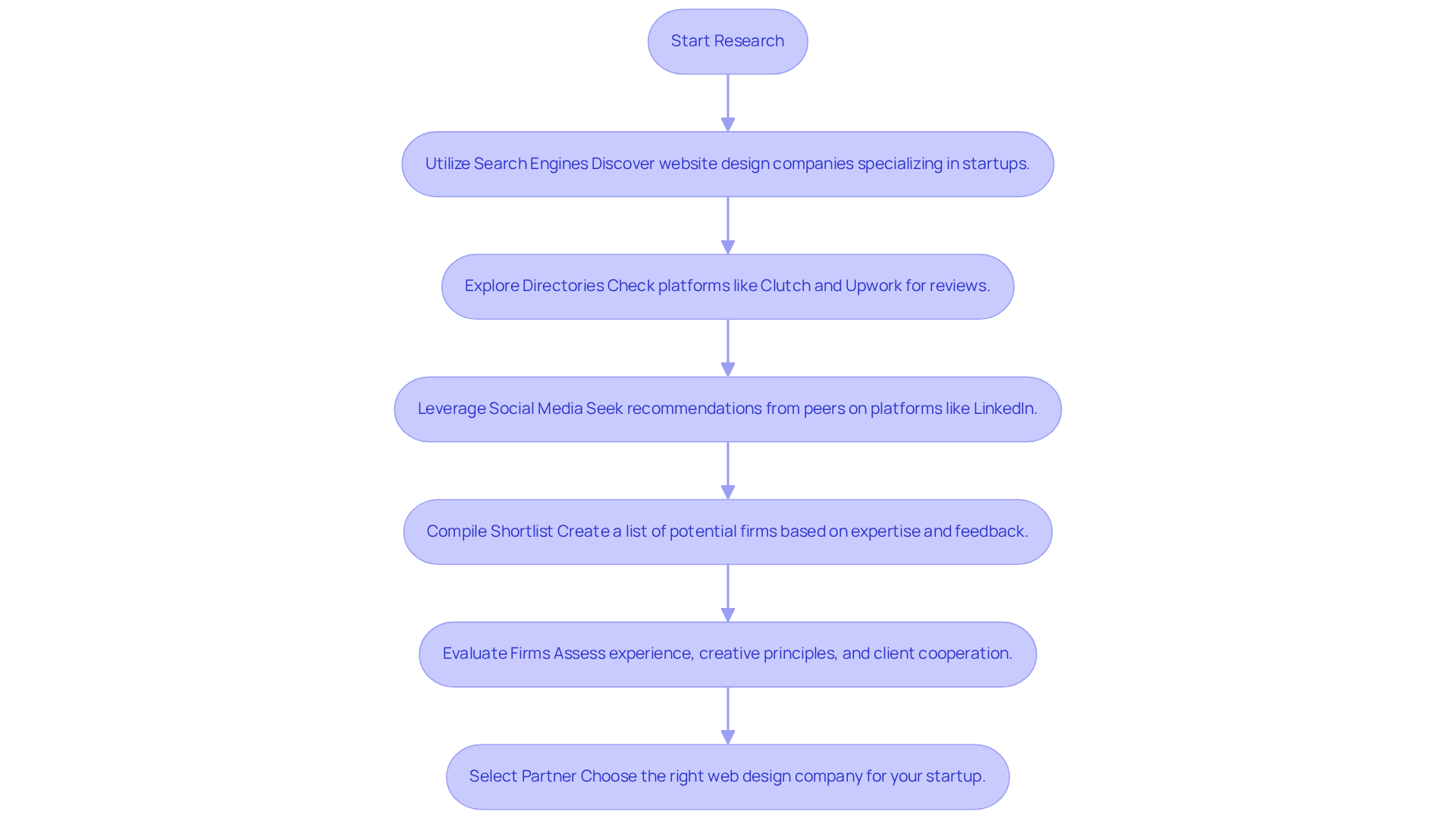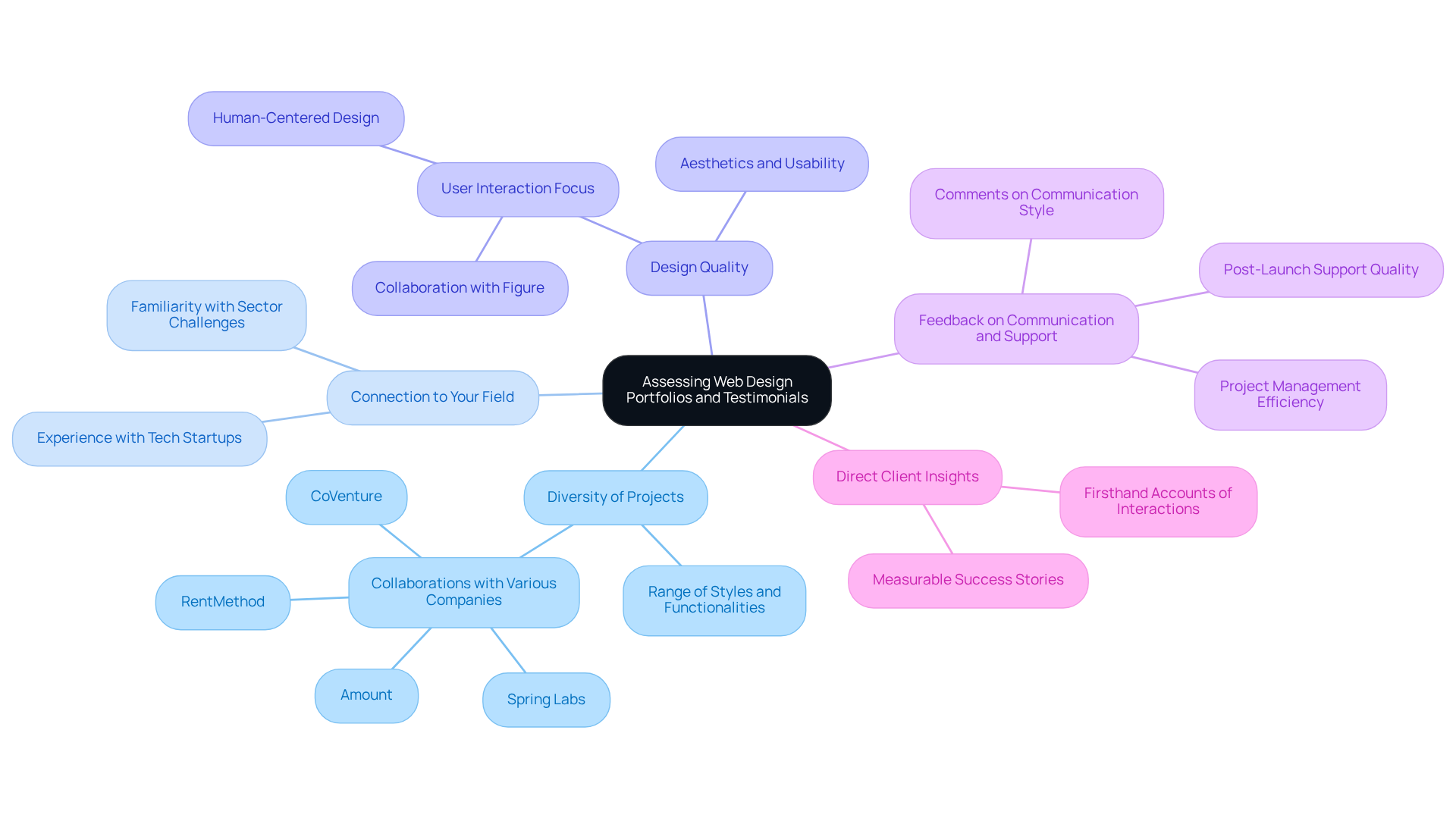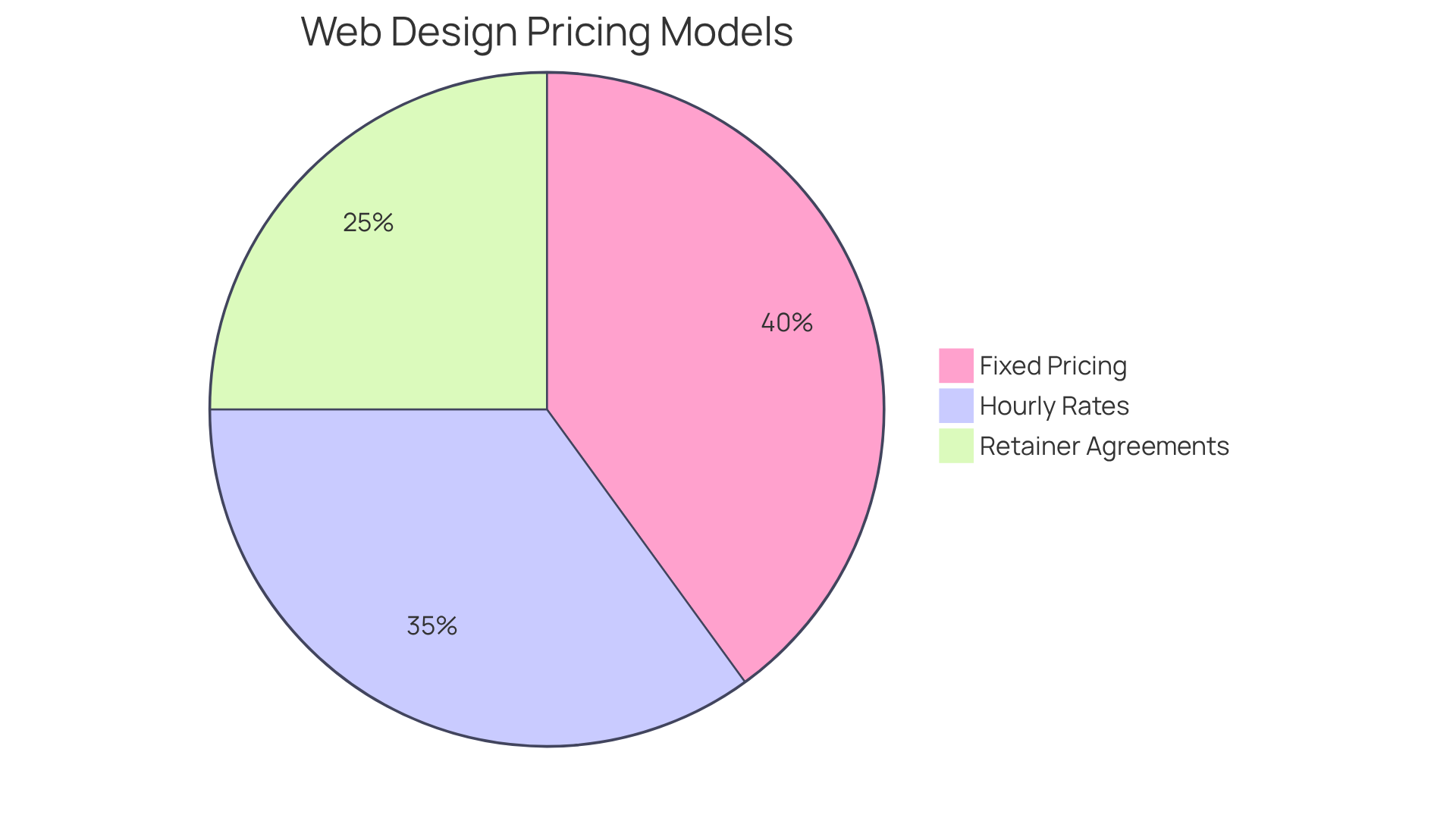Overview
Choosing the right website design company for your startup can feel overwhelming. Many founders grapple with defining their unique website requirements, and the pressure to make the right choice can weigh heavily on their shoulders. It’s essential to research potential companies, assess their portfolios and testimonials, and understand their pricing models and support options. This process can be daunting, as aligning your startup's goals with the design company's expertise and services is crucial for a successful partnership.
However, you are not alone in this journey. Many have faced similar challenges and found clarity through thoughtful exploration. By taking the time to reflect on your specific needs and values, you can navigate this process with confidence. Remember, the goal is to find a partner who not only understands your vision but is also committed to supporting you every step of the way. Together, you can create a website that truly reflects your startup's identity and meets your unique needs.
Introduction
Navigating the digital landscape can feel overwhelming for startups, particularly when it comes to choosing the right website design company. A thoughtfully designed website is more than just a digital storefront; it serves as a vital tool that can greatly impact a startup's success. Many founders find themselves anxious about this decision, as it can seem like a daunting task to ensure their vision aligns with the expertise of a web design firm.
This article aims to guide you through essential steps to:
- Identify your unique website needs
- Evaluate potential design partners
- Understand pricing models
Together, we can explore how startups can effectively bridge the gap between their aspirations and the skills of a web design firm, creating a compelling online presence that truly reflects their mission.
Define Your Startup's Unique Website Requirements
Creating an effective website for your startup can feel overwhelming, especially when you’re unsure of where to begin. It’s essential to clearly identify your core objectives to set a solid foundation. Consider these important questions:
- What is the primary purpose of your website? Whether it’s , providing information, or generating leads, understanding this will guide your decisions.
- Who is your target audience? Take a moment to reflect on their demographics and preferences; this insight will help you customize your content and layout to better serve them.
- What functionalities do you need? Think about whether you require eCommerce capabilities, contact forms, or user accounts. These features can significantly enhance the user experience.
- What style elements reflect your brand identity? Identify colors, logos, and typography that resonate with your brand's message and values.
Recording these requirements is not just a task; it’s a crucial step that will serve as a foundation for conversations with potential website design companies. This clarity will empower you to assess their capabilities effectively, ensuring they align with your company’s vision and goals. Remember, you’re not alone in this journey; taking the time to define your needs will lead you toward a website that truly reflects your startup’s mission.

Research and Evaluate Potential Web Design Companies
Begin your research by tapping into various online resources and networks, as navigating this process can feel overwhelming at times. Finding the right website design company is crucial for your startup’s success, and it’s important to approach this task with care and intention.
Utilize search engines to discover a website design company that specializes in serving startups. This is a vital step in ensuring your project is handled by professionals who understand your unique needs. Explore industry-specific directories like Clutch and Upwork, which offer detailed reviews and ratings of web development firms. Notably, Clutch features over 91,143 companies, allowing you to filter by expertise and client satisfaction. For example, organizations such as GLIDE® and CyberOptik have obtained high ratings for their efficient project management and user-friendly layouts.
Leverage social media platforms and professional networks like LinkedIn to seek recommendations and insights from peers in your industry. Connecting with others who have walked this path can provide invaluable guidance and reassurance. Compile a shortlist of potential website design companies based on their expertise, client feedback, and portfolio quality.
Once you have your list, evaluate each firm by considering their experience with new ventures, their creative principles, and their cooperative approach with clients. This assessment will assist in ensuring you and can effectively contribute to your business's growth. Remember, the right partner can make all the difference, and taking the time to choose wisely is an investment in your startup's future.

Assess Company Portfolios and Client Testimonials
When evaluating web design portfolios, it's essential to consider several key factors that can guide your assessment and alleviate the stress of finding the right partner:
- Diversity of Projects: Look for a portfolio that showcases a range of styles and functionalities, reflecting the agency's versatility and ability to adapt to your unique project requirements. RNO1 has effectively collaborated with various companies, including RentMethod and Spring Labs, demonstrating their capability to manage diverse projects across sectors, from technology ventures like Amount to creative firms such as CoVenture.
- Connection to Your Field: It's crucial to assess whether the agency is familiar with new ventures or companies in your sector. RNO1's work with tech startups showcases their capabilities as a website design company, illustrating their understanding of the unique challenges and needs within the tech landscape, and providing reassurance that they can navigate your specific context.
- Design Quality: Pay close attention to the aesthetics, usability, and overall user interaction of the websites presented. High-quality design goes beyond mere appearance; it should promote intuitive navigation and engagement. RNO1's transformative partnerships consistently focus on enhancing user satisfaction through human-centered design, as evidenced in their collaboration with Figure to redefine compensation management.
In addition to reviewing portfolios, client testimonials offer invaluable insights into the agency's performance:
- Feedback on Communication and Support: Look for comments regarding the agency's communication style, project management efficiency, and the quality of post-launch support. These factors are essential for a smooth collaboration, as highlighted by RNO1's successful engagements that emphasize strong client relationships and attentive support.
- Direct Client Insights: Consider reaching out to former clients for firsthand accounts of their interactions. This can provide a clearer view of the organization's reliability and effectiveness, especially in how RNO1 has assisted clients in achieving measurable success through innovative digital branding and UX.
As industry specialists have noted, the quality of creation directly impacts user experience and project success. Collaborating with a website design company like RNO1, who prioritize these aspects, can lead to more effective digital solutions for your business, easing your journey towards achieving your goals.

Understand Pricing Models and Ongoing Support Options
When navigating the complex world of pricing models with potential web design agencies, it’s important to recognize the various options available that can significantly impact your startup's financial journey:
- Fixed Pricing: Imagine knowing exactly what your financial commitment will be from the start. This model offers a set fee for the entire project, helping you budget effectively. For new businesses, this can minimize the anxiety of unexpected expenses. For instance, brochure websites typically range from $2,000 to $20,000, depending on their complexity.
- Hourly Rates: Alternatively, you might consider hourly rates, which can vary widely—typically from $25 to $150 per hour, with a median rate around $75. This model is particularly useful for projects where the scope may change or evolve, allowing for flexibility as your needs grow.
- Retainer Agreements: If ongoing support and maintenance are what you seek, retainer agreements could be your answer. These involve monthly fees, often ranging from $500 to $2,000 or more, depending on the level of service provided. This can be especially beneficial for startups needing continuous updates and assistance.
As you explore these options, it’s vital to inquire about ongoing support to ensure you have the necessary assistance after your website launches:
- What does post-launch support include? Consider updates, troubleshooting, and content management—essential elements for maintaining your website’s performance.
- How quickly can they respond to issues? Timely support is crucial for minimizing downtime and ensuring a smooth user experience, which is key to your success.
- Are there additional costs for support services? Understanding any potential extra charges will help you avoid surprises in your budget, allowing you to plan with confidence.
As Tim Jordan, a certified financial coach, wisely states, "You deserve to budget in a way that will make you feel comfortable and allow you to be who you are." By grasping these pricing models and support options, you can select a website design company that aligns with your financial strategy while providing the essential support needed for your startup's growth.

Conclusion
Choosing the right website design company can feel overwhelming for startups, and this pivotal decision can significantly influence their trajectory. It’s essential to define unique website requirements and conduct thorough research. By assessing portfolios, reading testimonials, and understanding pricing models, startups can find a partner that truly aligns with their vision and goals. This approach not only fosters collaboration but also enhances the chances of creating an online presence that resonates with their target audience.
As you navigate this selection process, consider the core objectives of your startup. Evaluate potential partners based on their expertise and client feedback, and think about the ongoing support they offer. Each of these factors is crucial in ensuring that the design company you choose can effectively contribute to your growth and success. By investing time and effort into this decision-making process, you can mitigate risks and enhance your chances of achieving a high-quality website tailored to your specific needs.
In the competitive landscape of startups, the significance of a well-designed website cannot be overstated. It serves as a critical touchpoint for potential customers and can make or break first impressions. Therefore, taking the time to carefully choose a website design company is not just an operational task; it is an investment in the future of your business. We encourage you to embark on this journey with diligence and clarity, ensuring that your online presence reflects your brand identity and effectively supports your business objectives. Remember, you are not alone in this process; many founders have faced similar challenges and emerged successfully by making thoughtful choices.
Frequently Asked Questions
What is the first step in creating an effective website for my startup?
The first step is to clearly identify your core objectives, which will set a solid foundation for your website.
How do I determine the primary purpose of my website?
Consider whether your website's main goal is eCommerce, providing information, or generating leads, as this understanding will guide your decisions.
Why is it important to know my target audience?
Knowing your target audience's demographics and preferences helps you customize your content and layout to better serve their needs.
What functionalities should I consider for my website?
Consider whether you need eCommerce capabilities, contact forms, or user accounts, as these features can significantly enhance the user experience.
How can I reflect my brand identity on my website?
Identify style elements such as colors, logos, and typography that resonate with your brand's message and values.
Why is recording my website requirements important?
Recording your requirements is crucial as it serves as a foundation for discussions with potential website design companies and helps ensure they align with your company’s vision and goals.
What should I keep in mind during the website design process?
Take the time to define your needs, as this will lead you toward a website that truly reflects your startup’s mission.




